When I arrived in Belém for COP30, I expected climate negotiations, speeches, and long policy documents. I didn’t expect the ocean to be so present in so many conversations, especially because previous COPs rarely gave the ocean much attention.
As I listened to scientists, Indigenous leaders, and coastal communities during COP, I started to see the ocean not just as a research subject, but as a quiet hero holding the world together. As someone who studies the ocean, I’ve long known its importance in regulating our climate and sustaining life. The ocean absorbs 30% of all the carbon dioxide we emit, and 90% of the excess heat we create. It is our biggest climate buffer, working tirelessly and silently.
But the ocean is reaching its limit. In just ten years, it has warmed by 0.2°C, an unimaginable shift for marine life. Coral bleaching is no longer rare—it is at its peak. Ocean acidification is eating away at shells and ecosystems. Sea-level rise is threatening all coastal areas. People in the coastal communities talked about falling fish catches, stronger storms, and land lost to erosion. It became clear that a weakening ocean harms not only ecosystems but also economies, food security, and traditions. Still, the ocean has rarely been given real importance in climate talks.
This year’s COP gave me hope!
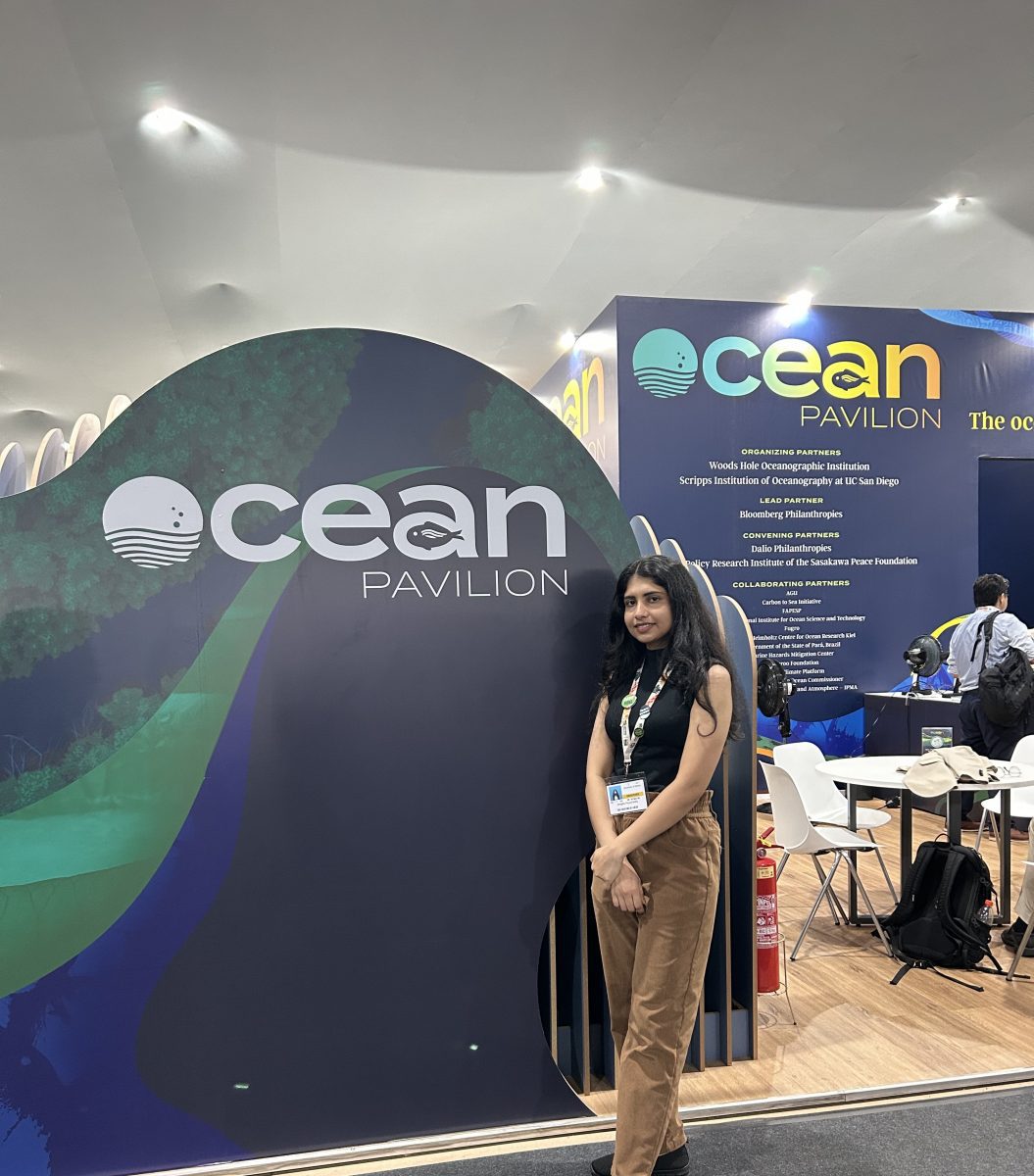 For the first time, there was a full Ocean Pavilion, not a tiny booth hidden in a corner, but a central, vibrant space filled with conversations that finally recognized the ocean as a climate powerhouse. I sat in panels where local communities, policymakers, and scientists spoke side by side, and I felt something shift. I hope the ocean is no longer an afterthought.
For the first time, there was a full Ocean Pavilion, not a tiny booth hidden in a corner, but a central, vibrant space filled with conversations that finally recognized the ocean as a climate powerhouse. I sat in panels where local communities, policymakers, and scientists spoke side by side, and I felt something shift. I hope the ocean is no longer an afterthought.
Countries also stepped up. Brazil and France launched a Blue NDC Taskforce to accelerate ocean-based climate action. Of the 66 coastal national climate plans submitted this year, 92% included ocean measures, a number that would have been unimaginable a few years ago. Brazil also introduced the Blue Package, offering technical guidance, finance pathways, and support for countries to include blue carbon, coastal resilience, and marine conservation in their next NDC updates. Ocean Breakthroughs was another milestone. This is a set of written science-based targets for marine renewables, conservation, shipping, tourism, and aquatic food systems. An online platform will track whether countries actually follow through, adding accountability to ambition.
And in one of the most hopeful moments, the High Seas Treaty reached 60 ratifications and is now set to enter into force in January 2026. Watching leaders celebrate this long-awaited achievement, I felt genuinely emotional. Brazil has even committed to ratifying the treaty before the end of the year. For the first time, the vast areas of our global ocean with no protection will finally have a chance.
But as I walked out of COP30 on the final day, I also felt a heaviness. Because even with all this progress, there is still so much more to do.
We can’t afford to wait; this is the moment for implementation. During one panel, a local community member was asked what he thinks about the future of the ocean. He answered, “In this situation, I don’t think about the future as tomorrow.” He and his community believe the future is today, and they are already taking steps to protect the ocean. I hope decision-makers and negotiators adopt this same mindset and act urgently to confront climate change and safeguard our ecosystems.
From the ocean-focused sessions I attended, I learned that we must create climate finance that truly includes the ocean. Right now, blue finance is less than 1% of global climate finance. We must prioritize coastal and island communities that contribute the least to climate change but bear the greatest impacts. We must make sure every country includes ocean solutions in their 2025 NDC updates. And we need to align policy, funding, and business so that protecting the ocean isn’t seen as charity, it’s seen as a smart economic strategy.
As a scientist, I came to COP chasing data and policy outcomes. But I am leaving with something else—an understanding that the ocean should not be just part of the climate conversation. It is the climate conversation. As a student who wants to communicate science beyond research papers, I will continue engaging in outreach with schools and local communities, helping people understand why the ocean matters for climate change and how even small actions can help protect it.
Now more than ever, the ocean needs our protection, and we need the ocean to shield us from the accelerating impacts of climate change.
Anagha Payyambally is a marine sciences graduate student.
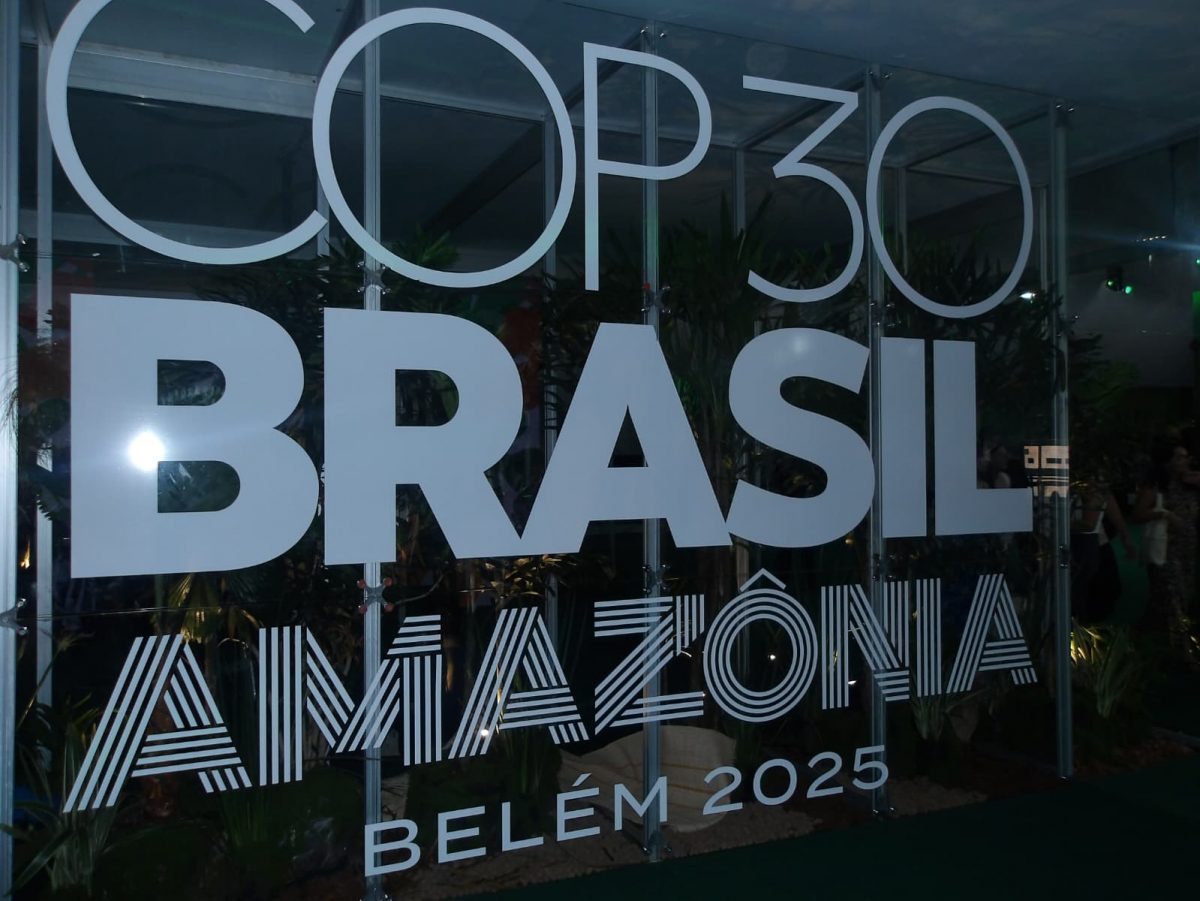 The theme of this year’s COP is implementation, turning ambition into tangible realities. It is both a necessity for addressing the climate crisis and a possible personal philosophy that I believe all students should incorporate, especially if they have a potential solution for a better future. The reason COP needs to choose this topic is that we are seeing a slowdown (and often a regression) in the significant progress made during the Paris Agreement of 2015. The Tropical Forests Forever Fund (TFFF) is one of many ambitious financial mechanisms that aim to compensate countries for restoration and conservation efforts. There are a plethora of factors, including land ownership, land use, historical conditioning, and more, that can create complex variables in the conversation. How do you ask 83+ countries to agree on a joint solution? It is a question that is continually revisited. Not to mention incorporating the perspectives of indigenous communities who have harmoniously lived amongst the many vulnerable lands that would benefit from these conservation efforts, but aren’t often represented in policy-making.
The theme of this year’s COP is implementation, turning ambition into tangible realities. It is both a necessity for addressing the climate crisis and a possible personal philosophy that I believe all students should incorporate, especially if they have a potential solution for a better future. The reason COP needs to choose this topic is that we are seeing a slowdown (and often a regression) in the significant progress made during the Paris Agreement of 2015. The Tropical Forests Forever Fund (TFFF) is one of many ambitious financial mechanisms that aim to compensate countries for restoration and conservation efforts. There are a plethora of factors, including land ownership, land use, historical conditioning, and more, that can create complex variables in the conversation. How do you ask 83+ countries to agree on a joint solution? It is a question that is continually revisited. Not to mention incorporating the perspectives of indigenous communities who have harmoniously lived amongst the many vulnerable lands that would benefit from these conservation efforts, but aren’t often represented in policy-making.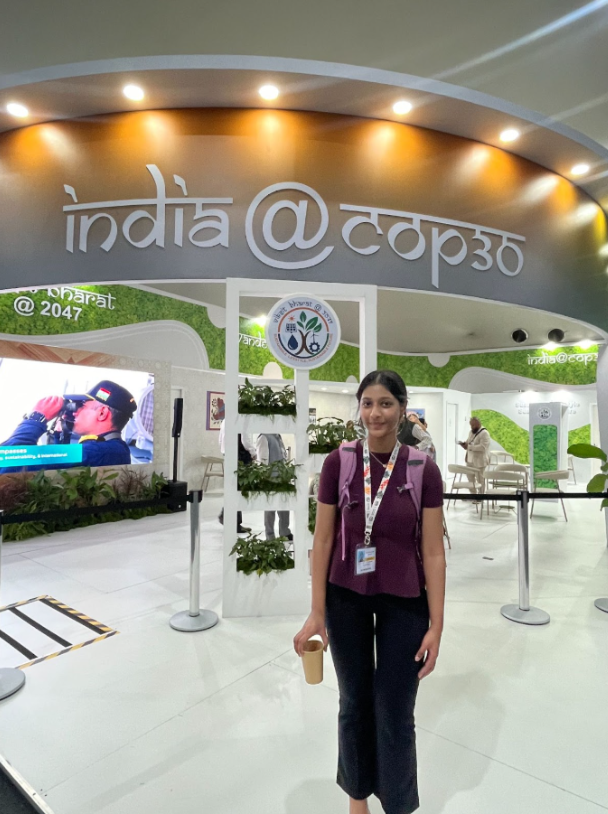
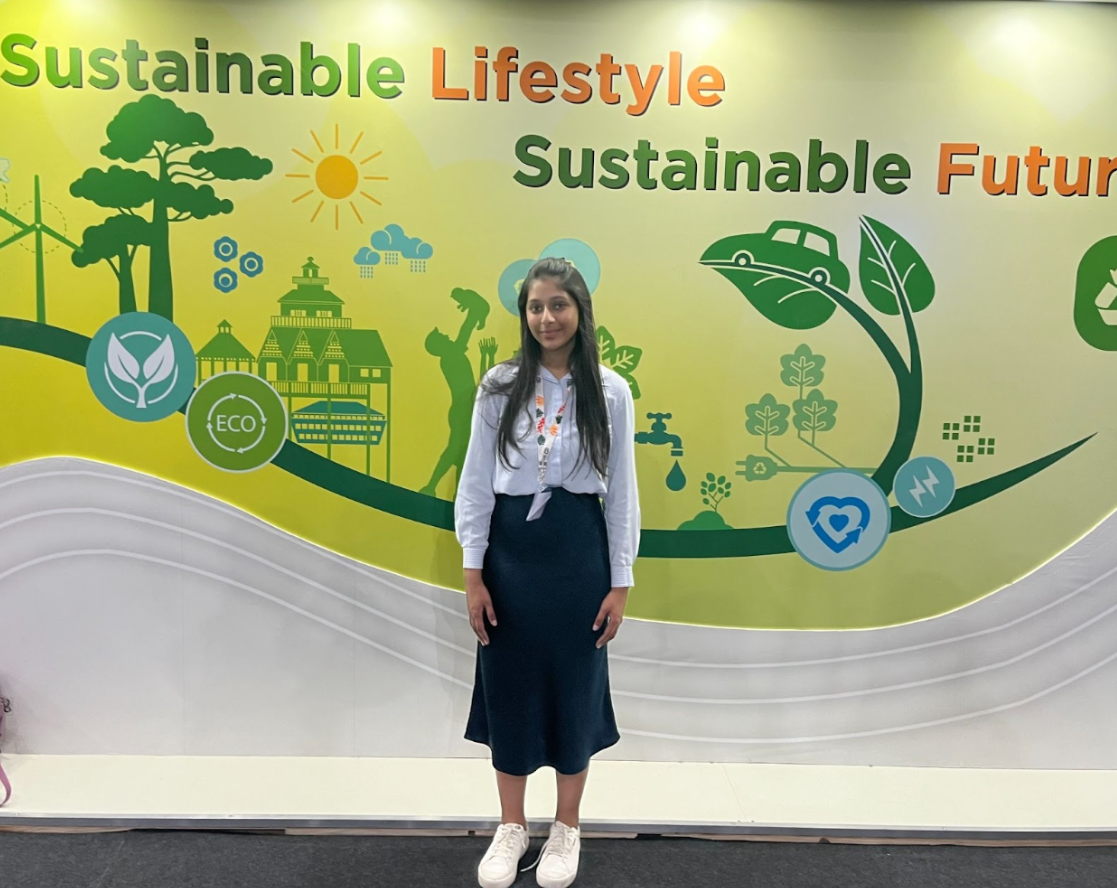 Understanding how federal and multilateral institutions (such as the U.S. Department of the Treasury, Securities and Exchange Commission, Federal Reserve, World Bank, and International Monetary Fund) function and how to coordinate across them is an important yet often overlooked skill.
Understanding how federal and multilateral institutions (such as the U.S. Department of the Treasury, Securities and Exchange Commission, Federal Reserve, World Bank, and International Monetary Fund) function and how to coordinate across them is an important yet often overlooked skill.  My first day at the conference was spent in the Green Zone. At the Conference of the Parties (COP), the Green Zone is largely dedicated to demonstrating tangible climate solutions and expanding public awareness of environmental solutions. The Green Zone is open to all, and features pavilions showcasing Brazilian governmental agencies, non-governmental organizations, and private companies. Additionally, the Green Zone promoted national and Amazônia culture, featuring indigenous vendors, local cuisine, and art. Furthermore, an objective of the event was to raise awareness and engage the population of the host city, Belém, with the UN’s climate agenda. I was able to visit a variety of pavilions, but the ones that interested me the most included a talk by the vice president of Brazil, Geraldo Alckmin, a COP and coffee: Oceans talk with Deloitte, and an exhibition by Be8 Energy. Be8 showcased a semi-truck powered by renewable biodiesel. Additionally, the Green Zone featured pavilions advocating for an end to the genocide in Palestine, as Israel’s invasion has devastated the natural environment of the region. Overall, the Green Zone provided me with an immersive experience that framed my perspective as I spent the rest of my week in the Green Zone.
My first day at the conference was spent in the Green Zone. At the Conference of the Parties (COP), the Green Zone is largely dedicated to demonstrating tangible climate solutions and expanding public awareness of environmental solutions. The Green Zone is open to all, and features pavilions showcasing Brazilian governmental agencies, non-governmental organizations, and private companies. Additionally, the Green Zone promoted national and Amazônia culture, featuring indigenous vendors, local cuisine, and art. Furthermore, an objective of the event was to raise awareness and engage the population of the host city, Belém, with the UN’s climate agenda. I was able to visit a variety of pavilions, but the ones that interested me the most included a talk by the vice president of Brazil, Geraldo Alckmin, a COP and coffee: Oceans talk with Deloitte, and an exhibition by Be8 Energy. Be8 showcased a semi-truck powered by renewable biodiesel. Additionally, the Green Zone featured pavilions advocating for an end to the genocide in Palestine, as Israel’s invasion has devastated the natural environment of the region. Overall, the Green Zone provided me with an immersive experience that framed my perspective as I spent the rest of my week in the Green Zone.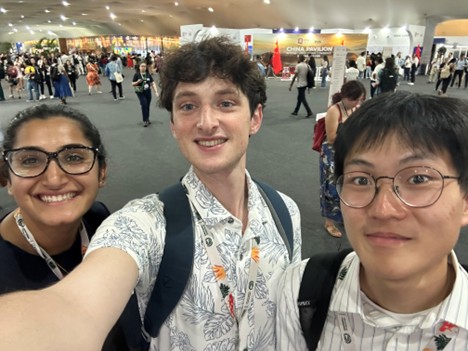
 There have been several discussions and plans to implement programs for countries to provide support and aid for those that are disproportionately impacted. Developed countries have even, to a certain extent, owned up to some responsibility for the vast damage they have caused to our environment. However, plans and discussions do not mean execution by any means. We simply do not have the luxury of ten more years until our climate rises past 1.5 degrees Celsius and truly, we have achieved irreparable damage to the environment.
There have been several discussions and plans to implement programs for countries to provide support and aid for those that are disproportionately impacted. Developed countries have even, to a certain extent, owned up to some responsibility for the vast damage they have caused to our environment. However, plans and discussions do not mean execution by any means. We simply do not have the luxury of ten more years until our climate rises past 1.5 degrees Celsius and truly, we have achieved irreparable damage to the environment. My first day at COP was oddly both what I was expecting and equally overwhelming. Before attending COP30, I had done research on previous COPs and was familiar with COP possessing a slow mediation process where countries often do not reach a “satisfying” conclusion. It was a known fact that different nations contain different perspectives, which consequently makes negotiation extremely difficult. There are notable deep-rooted historical divides and groupings of cultures, and while I was aware of this, seeing these relationships firsthand was a culture shock compared to social and racial groupings I had witnessed in America on a national level. One of the first events I attended at COP was the COP Presidency Consultation on Mountains and Climate Change. This meeting was the final consultation that was established to draw a conclusion on how to move forward in addressing climate issues in mountain regions. The Mountain Group, represented by a delegate from Kyrgyzstan as well as Nepal and Georgia, were the main drivers in proposing annual discussions on mountains and climate change. These groups also wanted to instate climate change in mountainous regions as an agenda item. The European Union (EU) countered this request by claiming that their region also has mountains and feels an annual conversation, as well as having this topic as an agenda item, is unnecessary. They stated that this workstream seemed counterproductive and it was preferable to have a streamlined subsidiary. Japan also agreed with this rhetoric and claimed that despite having mountain ranges in their region, they also aligned with the EU. I found it interesting that despite mountain regions collectively forming negotiations and counter-responses, the regions seemed to separate into groups: lower-income countries and economic and political powerhouses.
My first day at COP was oddly both what I was expecting and equally overwhelming. Before attending COP30, I had done research on previous COPs and was familiar with COP possessing a slow mediation process where countries often do not reach a “satisfying” conclusion. It was a known fact that different nations contain different perspectives, which consequently makes negotiation extremely difficult. There are notable deep-rooted historical divides and groupings of cultures, and while I was aware of this, seeing these relationships firsthand was a culture shock compared to social and racial groupings I had witnessed in America on a national level. One of the first events I attended at COP was the COP Presidency Consultation on Mountains and Climate Change. This meeting was the final consultation that was established to draw a conclusion on how to move forward in addressing climate issues in mountain regions. The Mountain Group, represented by a delegate from Kyrgyzstan as well as Nepal and Georgia, were the main drivers in proposing annual discussions on mountains and climate change. These groups also wanted to instate climate change in mountainous regions as an agenda item. The European Union (EU) countered this request by claiming that their region also has mountains and feels an annual conversation, as well as having this topic as an agenda item, is unnecessary. They stated that this workstream seemed counterproductive and it was preferable to have a streamlined subsidiary. Japan also agreed with this rhetoric and claimed that despite having mountain ranges in their region, they also aligned with the EU. I found it interesting that despite mountain regions collectively forming negotiations and counter-responses, the regions seemed to separate into groups: lower-income countries and economic and political powerhouses. Later on, I also attended the COP Presidency Consultation on the Special Needs and Circumstances of Africa, which I found especially insightful in terms of highlighting the dynamics between groups of countries. Colombia began the discussion by highlighting the regional bias of focusing on Africa and how this focus delegitimizes COP concerns. Pakistan also agreed with Colombia’s point and added that developing countries shouldn’t “compete vulnerabilities,” because all developing countries should be spotlighted at COP—a term that was echoed throughout the conference. The African Group disagreed, emphasizing that their unique position as a region that contributed less than 4% to global emissions yet struggles the most with climate change consequences raises a specific concern that needs to be addressed. Tanzania argued that this conference was “not a vulnerability contest” but rather a focused discussion on Africa utilizing “information already on the table.” South Africa reiterated the claim that Africa contributes the least to climate change but is subject to so many of its adverse effects, emphasizing that the region’s women, youth, and rural communities were most vulnerable. The South African delegate also stated that the country was already grappling with heightened food insecurity, noting that climate change caused a 34% decrease in food production on the continent. Zimbabwe, the Caribbean Community, and several other African countries emphasized that the Paris Agreement did not need to be rewritten, but rather implemented to provide attention to Africa.
Later on, I also attended the COP Presidency Consultation on the Special Needs and Circumstances of Africa, which I found especially insightful in terms of highlighting the dynamics between groups of countries. Colombia began the discussion by highlighting the regional bias of focusing on Africa and how this focus delegitimizes COP concerns. Pakistan also agreed with Colombia’s point and added that developing countries shouldn’t “compete vulnerabilities,” because all developing countries should be spotlighted at COP—a term that was echoed throughout the conference. The African Group disagreed, emphasizing that their unique position as a region that contributed less than 4% to global emissions yet struggles the most with climate change consequences raises a specific concern that needs to be addressed. Tanzania argued that this conference was “not a vulnerability contest” but rather a focused discussion on Africa utilizing “information already on the table.” South Africa reiterated the claim that Africa contributes the least to climate change but is subject to so many of its adverse effects, emphasizing that the region’s women, youth, and rural communities were most vulnerable. The South African delegate also stated that the country was already grappling with heightened food insecurity, noting that climate change caused a 34% decrease in food production on the continent. Zimbabwe, the Caribbean Community, and several other African countries emphasized that the Paris Agreement did not need to be rewritten, but rather implemented to provide attention to Africa. Latin America’s stance reflects a concern that elevating Africa as a distinct category could undermine their visibility. Africa may be marginalized or facing a climate crisis in a distinct way, but other countries seem to view the addressing of these issues as a threat to their region’s focus. Latin American countries share a culture and climate (as well as climate issues), which creates a solidarity based on history and culture. However, a shared solidarity can also isolate alternative regions as “others” who are a threat to their own climate focus, a dynamic that is likely emphasized within this COP negotiation.
Latin America’s stance reflects a concern that elevating Africa as a distinct category could undermine their visibility. Africa may be marginalized or facing a climate crisis in a distinct way, but other countries seem to view the addressing of these issues as a threat to their region’s focus. Latin American countries share a culture and climate (as well as climate issues), which creates a solidarity based on history and culture. However, a shared solidarity can also isolate alternative regions as “others” who are a threat to their own climate focus, a dynamic that is likely emphasized within this COP negotiation. What I found was a circle of tables, facing inward, with screens in the middle showing a policy document. One party leads the discussion and would hear out countries as world leaders decide the text, semantics, and phrasing of policy that will impact billions of lives. As I watched the parties work, I was struck by the push and pull of compromise, argument, and defiance. I listened as parties unanimously struck entire paragraphs of text while having unresolved conflict over the wording of a single sentence.
What I found was a circle of tables, facing inward, with screens in the middle showing a policy document. One party leads the discussion and would hear out countries as world leaders decide the text, semantics, and phrasing of policy that will impact billions of lives. As I watched the parties work, I was struck by the push and pull of compromise, argument, and defiance. I listened as parties unanimously struck entire paragraphs of text while having unresolved conflict over the wording of a single sentence. 
 I was able to attend a panel conduct by the Water for Climate Pavillion regarding NAPs and NDCS: Sectoral and Regional Insights. During this panel there was a variety of different panelists, such as Juanita Ariza Guzman (the Economic Commissioner for Latin America and the Caribbean of the United Nations (ECLAC),) Soraya Salcedo (the Deputy Director of International Cooperation of Colombia), and Paula Martinelli (Global Water Advocacy Officer for Wetlands International). These panelists all worked in a variety of fields, but with the same goal in mind: to preserve water in our world and to create a policy in support. However, there were a lot of perspectives and technical progress that I was unaware of. For example, I was able to talk to Paula Martinelli after the panel about her experience working in policy for water and other countries. She expressed the daily challenges she faces every day working in international affairs. She is constantly working with other countries to help them develop, to implement and/or improve their freshwater ecosystem. As much as you think countries would appreciate the support provided by an NGO, such as Wetland International, there is constant backlash that must be discussed. NGOs like Wetland International are doing their best to preserve water and support communities that are suffering from access to freshwater. But some countries only see the value of improving these issues if there is an economic benefit. In addition, as an advocacy officer in wetlands not only are you advocating for the community but also for the ecosystem.
I was able to attend a panel conduct by the Water for Climate Pavillion regarding NAPs and NDCS: Sectoral and Regional Insights. During this panel there was a variety of different panelists, such as Juanita Ariza Guzman (the Economic Commissioner for Latin America and the Caribbean of the United Nations (ECLAC),) Soraya Salcedo (the Deputy Director of International Cooperation of Colombia), and Paula Martinelli (Global Water Advocacy Officer for Wetlands International). These panelists all worked in a variety of fields, but with the same goal in mind: to preserve water in our world and to create a policy in support. However, there were a lot of perspectives and technical progress that I was unaware of. For example, I was able to talk to Paula Martinelli after the panel about her experience working in policy for water and other countries. She expressed the daily challenges she faces every day working in international affairs. She is constantly working with other countries to help them develop, to implement and/or improve their freshwater ecosystem. As much as you think countries would appreciate the support provided by an NGO, such as Wetland International, there is constant backlash that must be discussed. NGOs like Wetland International are doing their best to preserve water and support communities that are suffering from access to freshwater. But some countries only see the value of improving these issues if there is an economic benefit. In addition, as an advocacy officer in wetlands not only are you advocating for the community but also for the ecosystem.  Entering the United Nations annual climate summit to a police barricade and indigenous communities selling their products outside in the intense heat and humidity was not something I anticipated. However, that was slightly naive of me, because we are at an international summit with international leaders. However, the tension between who is heard and who is just being listened to was palpable throughout the conference. Before getting to the conference, we had seen the headlines about the protests by local communities, but I did not realize the proliferation of the divide.
Entering the United Nations annual climate summit to a police barricade and indigenous communities selling their products outside in the intense heat and humidity was not something I anticipated. However, that was slightly naive of me, because we are at an international summit with international leaders. However, the tension between who is heard and who is just being listened to was palpable throughout the conference. Before getting to the conference, we had seen the headlines about the protests by local communities, but I did not realize the proliferation of the divide. This division between who is being heard and listened to is the most evident when discussing financing the loss and damages fund. It is apparent that developed nations, international monetary bodies, and international aid organizations are not designed to help enable the country to build resiliency of any kind, financial, social, political, or environmental. The methods currently in place do not allow funds to be distributed to building political infrastructure and knowledge on these topics, they are currently only designed for specific projects. This puts these countries in a cycle of never getting the money to prevent these issues from happening or being forward thinking. This division is largely echoed throughout the larger Loss and Damage Fund COP negotiations as well. The division here was what countries have money to spend and what countries need to spend money to survive. As you can probably infer they are not seeing eye to eye. Which is just defeating because if we cannot come together for our collective earth what can we come together for?
This division between who is being heard and listened to is the most evident when discussing financing the loss and damages fund. It is apparent that developed nations, international monetary bodies, and international aid organizations are not designed to help enable the country to build resiliency of any kind, financial, social, political, or environmental. The methods currently in place do not allow funds to be distributed to building political infrastructure and knowledge on these topics, they are currently only designed for specific projects. This puts these countries in a cycle of never getting the money to prevent these issues from happening or being forward thinking. This division is largely echoed throughout the larger Loss and Damage Fund COP negotiations as well. The division here was what countries have money to spend and what countries need to spend money to survive. As you can probably infer they are not seeing eye to eye. Which is just defeating because if we cannot come together for our collective earth what can we come together for?